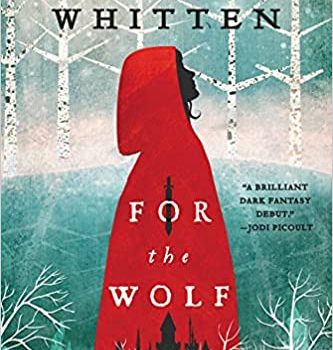Liz Bourke Reviews For the Wolf by Hannah Whitten
 For the Wolf, Hannah Whitten (Orbit 978-0-356516363, £8.99, 480pp, tp) June 2021.
For the Wolf, Hannah Whitten (Orbit 978-0-356516363, £8.99, 480pp, tp) June 2021.
Hannah Whitten’s debut novel, For the Wolf, is one of those books I could wish I had enjoyed more. It almost certainly does not need my approbation, for it has all of the traits of a novel that should find broad-based success: a young, headstrong protagonist; a handsome, self-sacrificing, broody male love interest; an easy-to-read, relatively compelling voice; magical curses and centuries-old magical conflict; and worldbuilding that makes very few demands. While I found it entertaining, I also found it predictable and lacking in depth.
Valleyda is a country on the edge of a great, impenetrable, dead forest: the Wilderwood. Centuries ago, a man and a woman made a bargain with the Wilderwood. The exact nature of that bargain is lost to history, but the man is remembered as a monster: the Wolf who trapped five legendary kings within the Wilderwood and who – apparently – lets loose other monsters on occasion. Over the course of the centuries, three young women have been sacrificed to the Wolf and the Wilderwood, because an old bargain, or an old curse, persists to claim them. In Valleyda, the First Daughter (of the monarch) is for the throne. The Second Daughter is for the Wolf. (Presumably they lacked an occasion where the first daughter died in infancy and the second daughter became first, which seems like it might have occasioned some difficulties, especially if family sizes were small. I was frequently distracted by this and similar practical wonderings as I read For the Wolf.)
Redarys and Neverah – Red and Neve – are twin sisters, daughters to the queen of Valleyda. Red is the younger by minutes, and has known all her life that as soon as she comes of age, she’ll be delivered to the edges of the Wilderwood, from which she’ll never return. Since her first encounter with the edge of the Wilderwood, a few years previously, she’s had a strange, dangerous, difficult-to-control power related to plants, a power that she fears might hurt people. That’s why, although the people who care for her – particularly her sister – urge her to run away, she goes through with giving herself to the wood.
Once in the Wilderwood, though, it becomes clear that the history and stories Red knows are less than perfectly true. The wood wants her blood, yes, but the Wolf is a man called Eammon, the son of the original pair to bargain with the Wilderwood, and instead of hurrying to murder her horribly, he seems instead to want to keep her safe. Neither the Wolf nor the wood are themselves monstrous, but instead they’re keeping something more monstrous contained: a world of shadows, into which the five kings went, and from which monsters – and possibly the kings, warped by their new surroundings – are constantly trying to break out. Red’s power may be the key to keeping them back, if she and Eammon can work together.
Meanwhile, outside the forest, Neve is determined to save her sister. A faction within the religious order that is the main reason for Valleyda’s prosperity offers her some prospect of weakening the Wilderwood and removing its hold on her sister, but the power they offer Neve comes with strings attached. And weakening the Wilderwood will only put Red at more risk. But the priestesses who have recruited Neve believe, it seems, in the power of the Kings whose return they pray for – which may not be all that different from the monstrous shadows.
Neve and Red are working at cross-purposes, and – as becomes obvious when Red manages to leave the wood in order to try to reassure her sister – Neve may not be able to extricate herself from the plans of those around her, to tragic and dramatic consequences. Meanwhile Red and Eammon have been developing a mutual attraction – an attraction I would find much more believable if Eammon had a personality other than “hot” and “inclined towards martyrdom”: he comes across largely as a blank slate for projection, a love-interest-shaped cutout that very occasionally does something surprisingly human.
The novel is told primarily in the first person, from Red’s point of view, with occasional interludes in the third person focused on Neve’s point of view. Whitten has a breezy, entertaining voice and brisk way with pacing. For the Wolf strikes me as shallow: the most interesting thing about it is the relationship between the sisters, and between two secondary characters, and neither of these things gets as much development as I’d prefer. It would also be nice if I could remember seeing any evidence that queer people exist within the world of the book, but in the book’s defence, it has a very limited cast.
I really shouldn’t criticise a book for being predictable, for being a not-particularly-novel remix of things I’ve seen done before (and better), because that’s the critic’s disease. Novelty isn’t valuable of itself – though after the first 2,000 or so books it can, I fear, take on an outsized appeal. For the Wolf is (my complaints about its love-interest aside) a reasonably well-constructed fantasy with a strongly romantic bent. But it didn’t suit me much at all.
Liz Bourke is a cranky queer person who reads books. She holds a Ph.D in Classics from Trinity College, Dublin. Her first book, Sleeping With Monsters, a collection of reviews and criticism, is out now from Aqueduct Press. Find her at her blog, her Patreon, or Twitter. She supports the work of the Irish Refugee Council and the Abortion Rights Campaign.
This review and more like it in the August 2021 issue of Locus.
 While you are here, please take a moment to support Locus with a one-time or recurring donation. We rely on reader donations to keep the magazine and site going, and would like to keep the site paywall free, but WE NEED YOUR FINANCIAL SUPPORT to continue quality coverage of the science fiction and fantasy field.
While you are here, please take a moment to support Locus with a one-time or recurring donation. We rely on reader donations to keep the magazine and site going, and would like to keep the site paywall free, but WE NEED YOUR FINANCIAL SUPPORT to continue quality coverage of the science fiction and fantasy field.
©Locus Magazine. Copyrighted material may not be republished without permission of LSFF.








